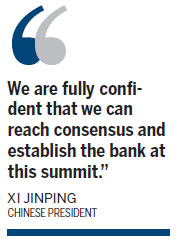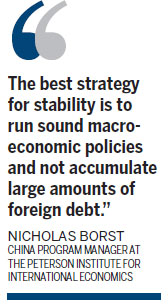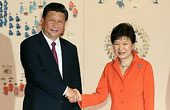
BRICS' new bank timely idea
Updated: 2014-07-08 13:08
By Wu Jiao in Beijing and Chen Weihua in Washington (China Daily USA)
Comments Print Mail Large Medium Small
Five major emerging economies, Brazil, Russia, India, China, and South Africa - known as BRICS - are jointly aiming during an upcoming summit in Brazil to set up a $50 billion development bank to fund extensive infrastructure projects.
China's Vice-Foreign Minister Li Baodong, said that the "time is ripe" to announce the BRICS development bank during the July 15-17 summit in Fortaleza, Brazil.
Chinese President Xi Jinping will attend the summit in his second trip to Latin America since taking office as head of state last year. However, due to scheduling, Xi will not attend the final of the World Cup, as Brazil had hoped, Li said on Monday.
The new bank, along with a $50 billion emergency reserve, will help the five nations become less dependent on the US dollar and fend off exchange-rate turbulence, experts and oG cials said. Establishing the bank will mark a milestone in the current international currency system that has long been dominated by the US and Europe, they said.

"Concerning the bank, all parties are in consensus. Of course, there are a few differences and viewpoints on technical issues ... but our goal is to establish the BRICS bank as soon as possible," Li said.
He did not elaborate on the bank's share structure, where it would be established or who would first preside over the bank, although he explained that "BRICS members must establish consensus through friendly consultation".
"We are fully confident that we can reach consensus and establish the bank at this summit," he added. People familiar with the issue said the ; ve countries will contribute equal shares to the bank, or $10 billion each.
The five nations have a combined GDP that represents one-fifth of the world's total GDP and also have significant geopolitical influence in the world. They have been eager to set up their own financial institutions instead of relying solely on existing ones such as the World Bank and the International Monetary Fund.
AI er attending the BRICS summit, Xi will pay a visit to four Latin American countries of Brazil, Argentina, Venezuela and Cuba from July 17 to 23.
Zhang Jun, an official in charge of international economic affairs at the Chinese Foreign Ministry, said the bank and the emergency currency reserve will support infrastructure construction among member countries and in other emerging markets. The bank will also help new emerging economies better manage global capital risks and financial turbulence.
Eswar Prasad, a senior fellow at the Brookings Institution and a professor at Cornell University, said the BRICS bank would be an important symbol of the rising stature of major emerging-market economies, which now have the resources to play a significant role in international finance.
"By combining their sources to invest in their own developmental needs, the BRICS are also hoping to initiate a challenge to existing global monetary arrangements and signal their frustrations with the lack of progress on reforming the governance of international financial institutions.
Prasad, a former head in China for the International Monetary Fund, said setting up the BRICS bank would be an important signal that the major emerging-market economies are willing to cooperate and follow through in making progress toward their common goals.
"This substantive action would be a key step that turns statements and rhetoric about cooperation among these countries into reality," he said.
Nicholas Borst, a research associate and China program manager at the Peterson Institute for International Economics in Washington, said he is largely supportive of the BRICS bank initiative, provided that it meets international best practices for environmental and social safeguards.

"It represents an effort to pool finances amongst emerging market economies and support new infrastructure projects, which should contribute to economic growth," he said.
But Borst expressed skepticism about the bank's usefulness in changing the nature of the international monetary system or fending off exchange-rate turbulence. "The best strategy for stability is to run sound macroeconomic policies and not accumulate large amounts of foreign debt," he said.
Yukon Huang, a senior associate in the Asia Program of Carnegie Endowment for International Peace, described Xi's upcoming visit to Latin America as "especially important" given the tensions in South and East China seas between China and other countries and over the foreign policy and security concerns between China and the US.
"Thus, China is keen to strengthen its relations with Latin America, especially Brazil, but also with some of the other major nations," Huang said.
He cautioned that relations should also be handled carefully so it is regarded as mutually beneficial by both sides.
Carl Meacham, director of the Americas program at Center for Strategic and International Studies, said Xi's trip will likely show a Chinese government ready and willing to increase its economic ties to countries central to its own strategic interests in the Americas.
"This should not come as a surprise, given China's engagement in the region in recent years, which has steadily shifted away from pure trade in goods and towards direct investment in projects in the region," he said.
Contact the writers at wujiao@chinadaily.com.cn and chenweihua@chinadailyusa.com
(China Daily USA?07/08/2014 page1)




